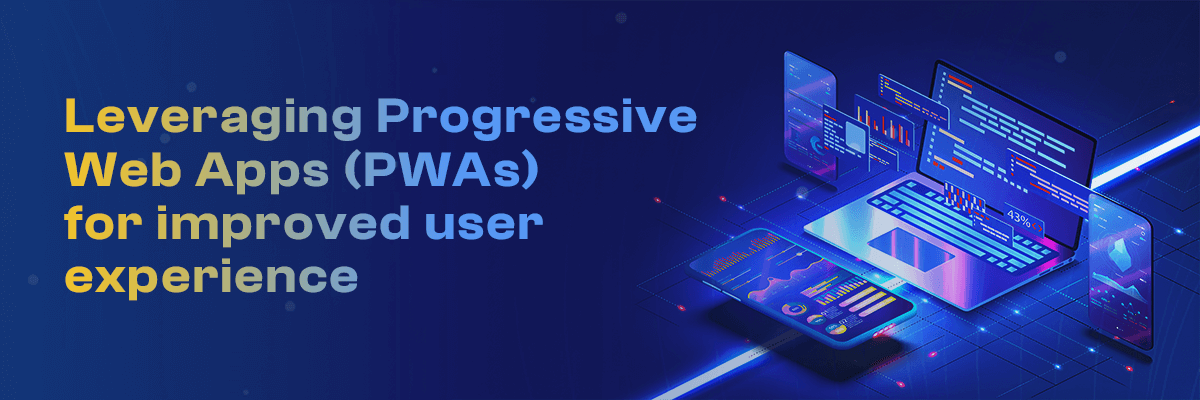Leveraging Progressive Web Apps (PWAs) for improved user experience

The rapidly changing technologies around the world offer a solution to the problem of downloading multiple apps on a phone, which often consumes a significant amount of space: Progressive Web Apps. These are application software delivered through the web, utilizing common web technologies such as HTML, CSS, JavaScript, and WebAssembly in their development. They are designed to function seamlessly on both desktop and mobile devices, across any platform equipped with a standards-compliant browser.
Features of Progressive Web Apps
To understand these apps better, we need to understand some different features of the app –
- They are less costlier
Web technologies such as HTML, CSS, and JavaScript can be utilized to develop Progressive Web Apps (PWAs), which are a more cost-effective alternative to building traditional mobile applications for each operating system (iOS, Android, etc.). Native mobile applications often demand more time and resources for development compared to web apps. They entail distinct requirements for each operating system and also involve additional app store maintenance fees.
- Security benefits
HTTPS is utilized in PWA development to encrypt data exchanged between the app and the server, making it inherently more challenging for hackers to access sensitive information. Additionally, PWAs require an app manifest, which dictates how an app can be launched and displayed, and they rely on Service Workers to enable app functionality. PWAs typically have fewer permissions than native apps, thereby reducing their vulnerability to security risks. In conclusion, these integrated technologies support and enhance app security by mitigating potential attacks.
- Can be linked
Conventional web applications, unlike traditional mobile apps, can be accessed directly through a URL and do not need to be installed or set up. By linking directly to a page you want users to view and even anchoring to specific text, this URL structure makes it simple to encourage users to interact with particular content. Driving specific user actions within native mobile applications may require additional UI development and thoughtful in-app messaging.
- Search engine optimised
Progressive Web Apps (PWAs) are easier to discover on the internet and are more search engine-friendly. They adhere to a set of international standards and formats that facilitate the cataloging, ranking, and surfacing of content in search engines, supporting this objective. For instance, a website needs to support HTTPS and have a web app manifest to be classified as a PWA. Such contemporary technical specifications not only enhance SEO but also bolster application security.
- Can work offline
Customers typically envision a blank page, devoid of any information, when they think of browsing a website offline. However, this isn’t an issue with a PWA. It can cache data for a more uninterrupted experience, thanks to its Service Worker. In particular, all data on a PWA will be saved to display on a subsequent visit because it is cached after every loading session. Therefore, even without a network connection, users can still engage with a PWA to some degree. Put another way, even when a customer accesses the page offline, all of the data from the initial load is still visible. PWAs may, therefore, offer users consistent websites and captivating offline experiences.
How can these apps improve user experience?
A business can now consider having a Progressive Web App instead of a traditional app, as it can be cost-effective while also enriching the user experience. Here are some ways in which PWAs can improve user experience:
- Better loading speed – Apps that take time to load are already losing the game against their competitors. However, Progressive Web Apps (PWAs) are designed to load rapidly, providing users with a seamless experience. This is achieved through strategies such as performance optimization, instant loading, and resource caching.
- Push notifications – Users can receive push notifications from PWAs even when they’re not actively using the app, informing them of updates, promotions, or other pertinent information. This promotes user engagement and re-engagement. According to research, companies can increase 90-day app retention by 190% by sending push or pop-up notifications.
- Responsive design –Due to their utilization of responsive design principles, Progressive Web Apps (PWAs) ensure that users consistently enjoy the optimal experience, irrespective of the device or screen size they are using. This enhancement significantly bolsters usability and accessibility for a broader spectrum of users.
- Better security – Progressive Web Applications (PWAs) enhance user trust and safeguard sensitive data by employing HTTPS to ensure secure communication between the user’s device and the server.
Conclusion
With changing technologies, PWAs can be considered to be one of the finest things for young-age businesses seeking to establish a presence on their customers’ mobile devices.
Leverage Progressive Web Apps (PWAs) to take your business to the next level! Jet2 Travel Technologies is a leading expert in PWA development, and we can help you create an app that offers a seamless user experience, improved loading speeds, and greater customer engagement. Contact us today to learn more about how PWAs can revolutionize your business!


